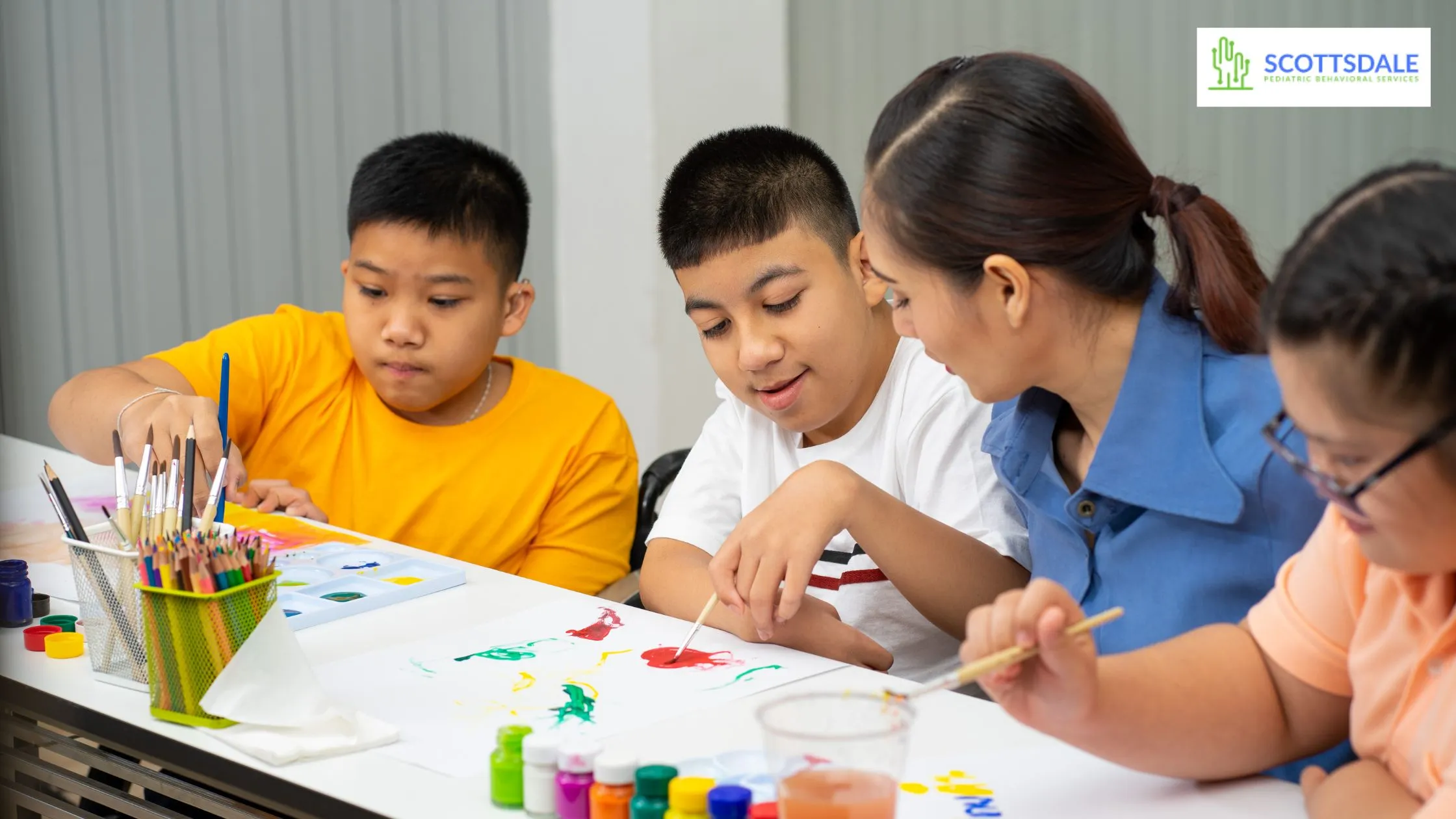Social skills are key to building relationships, clear communication and everyday life. For many children, especially those with developmental or behavioral differences, these skills don’t come naturally and need to be taught intentionally. Applied Behavior Analysis (ABA) offers practical, evidence-based tools to support social development through play, structure and positive reinforcement.
Here are ten ABA-based activities to support social growth, along with guidance for parents and caregivers to help children apply what they learn in real life.
1. Role-Playing Social Situations
Role-playing gives children a safe and structured way to practice everyday interactions—introducing themselves, asking to join a group or resolving a disagreement. By acting out these situations, kids get to practice what to say and how to say it.
Some children may resist the “pretend” element or feel self-conscious. If that happens, simplify the scene and start with a fun, familiar context, like ordering food at a pretend restaurant. The key is to make the interaction feel natural and not too scripted. Over time, role-playing can become a bridge between learning and real life.
2. Social Stories
Social stories are short, personalized stories that help children understand social situations and expectations. A well-written story can calm anxiety and provide clarity around unfamiliar situations like a dentist visit or birthday party.
While social stories are powerful, they’re most effective when they’re consistent and tailored. Children may lose interest if the stories feel generic or unrelated to their lives. Involve your child by adding photos or having them help illustrate the story. Review the story regularly, especially before the event, to make it more memorable.
3. Emotion Identification Through Play
Understanding and naming emotions is a basic social skill. Emotion games like matching faces to feelings, acting out emotions or identifying feelings in storybooks can help children learn to empathize and respond in social situations.
Challenges arise when children can’t carry this knowledge into real life. If a child can match a sad face on a flashcard but can’t recognize when a peer is upset, it’s a sign more practice is needed. Narrating emotions out loud during your daily routine (“You looked frustrated when that happened; what helped you feel better?”) can help bridge the gap.
4. Cooperative Play Activities
Games and activities that involve turn-taking, teamwork or joint problem-solving provide opportunities to practice many social skills. Board games, block building and team-based challenges can be structured to focus on patience, communication and conflict resolution.
If your child becomes overwhelmed or disengaged during group play, start with one peer and a short, simple activity. Gradually increase complexity and group size as your child builds confidence and comfort.
5. Practicing Conversation Starters
Starting a conversation can be daunting for many children. Practicing openers like “What’s your favorite animal?” or “Do you want to play with me?” can make initiating social interaction feel more manageable.
Introduce a few go-to conversation starters and practice them in low-stakes environments like at the dinner table with family. If your child forgets or freezes up, offer a prompt or cue but always praise the effort. Even an attempt counts as progress.
6. Observing Peer Models
Watching other children successfully navigate social situations can be very powerful. Peer modeling helps children learn how to act in specific situations like joining a game, apologizing or offering help by observing someone similar to themselves.
Look for opportunities to highlight positive behaviors when they occur naturally. You might say, “Did you see how Sam asked to play and waited patiently? That worked really well.” These observations help your child connect the dots between action and outcome.
7. Learning with Social Skills Videos
Short video clips that demonstrate social interactions, both positive and negative, can be a great way to reinforce concepts like body language, tone of voice and perspective-taking. This can be especially helpful for visual learners.
Videos work best when paired with discussion or role-play. After watching, talk about what happened and how the characters felt. Then try acting out a similar scene together. This helps move the learning from the screen to real life.
8. Using Reward Charts for Social Goals
Simple reward charts can boost motivation and help children track progress towards a social goal like making eye contact or staying on topic during a conversation. The chart provides a visual reminder and a reason to celebrate small wins.
To be effective, keep goals clear and achievable. Focus on one or two behaviors at a time and provide consistent feedback. Involve your child in setting up the chart or choosing a reward to help them feel more invested.
9. Creating Behavioral Contracts
For older children, a behavioral contract outlining social goals, expected behaviors and rewards can provide structure and clarity. These work best when developed collaboratively so the child is involved in defining both expectations and outcomes.
Contracts help children take ownership of their growth. If progress stalls, review the goals together and make adjustments. Flexibility and encouragement are key to keeping the plan realistic and motivating.
10. Social Skills Groups
Social groups led by trained professionals provide children a safe and supportive environment to practice with peers. These groups often involve games, discussions and real-time feedback to build cooperation, perspective-taking and communication.
If your child is hesitant, ask if they can observe a session before joining. Prepping them for what to expect and reviewing their experience afterward can help build trust and reinforce new skills.
Supporting Social Skills at Home
Home is full of daily opportunities for social learning. As a parent or caregiver, your actions, feedback and consistency play a powerful role in helping your child develop and maintain these skills.
You can:
- Model social behavior by narrating your thoughts: “I didn’t understand what she meant, so I asked her to explain again.”
- Create low-pressure practice opportunities during meals, errands or playdates.
- Prompt gently when needed and always praise effort, not just outcomes.
- Reflect after social interactions, talk about what went well and brainstorm ideas for next time.
Helping Your Child Apply Skills in Different Environments
One of the biggest challenges in social skills training is generalization, helping children apply what they learn in therapy or at home to new environments like school, playgrounds or family gatherings. Consistency and collaboration are key.
Talk to your child’s teacher, therapist and other caregivers about their social goals and how to support them. Arrange opportunities to practice in different settings and prepare your child in advance. Reinforce successes across environments, even small ones.
For example, if your child says hello to a neighbor or shares a toy at the park, acknowledge it right away. Over time, these moments add up to real, lasting change.
Consult Scottsdale Behavioral Pediatric Services Today
Building social skills is a dynamic, ongoing process, especially for children who need extra support. ABA-based activities provide the foundation but it’s the real-world practice, gentle reinforcement and supportive relationships at home and in the community that make those skills stick. Every child is different. What matters most is consistency, encouragement and meeting your child where they are. With the right tools and support, meaningful growth is not only possible but highly achievable.
If your child could benefit from personalized support in developing social skills, Scottsdale Pediatric Behavioral Services offers compassionate, evidence-based ABA therapy tailored to your child’s unique needs. Contact us today to learn how we can help your child thrive socially and emotionally.
FAQs
What is ABA therapy and how does it help with social skills?
ABA therapy, or Applied Behavior Analysis, is a therapeutic approach that uses principles of behaviorism to teach and reinforce desired behaviors. In the context of social skills, ABA therapy provides structured strategies and activities to help children learn social interactions, understand social norms and build confidence in various social settings.
How can role-playing scenarios help my child?
Role-playing scenarios allow children to practice social interactions in a controlled environment. By acting out different scenarios, such as greeting a friend or asking for help, children can learn the right responses and behaviors. This practice helps them feel more comfortable and prepared for real-life social interactions.
What are social stories and how do they support social skills development?
Social stories are personalized narratives that describe specific social situations and the right responses. Through simple language and illustrations they help children understand social norms and expectations. By reading and discussing these stories children can gain insight into how to handle similar situations in real life.
How do emotion identification games help children with social skills?
Emotion identification games teach children to recognize and label different emotions which is key to effective social interactions. For example, by using picture cards or charts and playing matching games, children learn to understand and express their feelings and recognize the feelings of others, thereby enhancing empathy and communication skills.
What are group play activities and why are they important for social skills?
Group play activities are interactions with peers in structured settings, such as board games, cooperative tasks or team sports. These activities teach children social skills like sharing, turn-taking and cooperation. They also provide opportunities for children to learn about group dynamics and build friendships.
How can conversation starters help my child’s communication skills?
Conversation starters are prompts or questions that help children initiate and sustain conversations. When practicing these starters children can learn to start interactions and keep conversations going with peers. This is essential for developing conversational skills and building relationships.
How do I implement role-playing scenarios at home?
- Set up simple, structured situations relevant to your child’s daily life.
- Start with guided role-plays where you model the behavior and gradually reduce guidance as your child becomes more comfortable.
- Encourage feedback and discuss what went well and what could be improved.
How often should I use social stories with my child?
Use social stories regularly to reinforce learning and understanding. Read the story with your child before they encounter the specific social situation described in the story. Revisit the story periodically to make sure the concepts are understood and to prepare your child for similar situations.
What do I need for emotion identification games?
For emotion identification games you will need picture cards or charts showing different emotions. These help children match emotions with facial expressions or situations. You can also use real-life scenarios or role-plays to practice identifying emotions.
Where can I find or create group play activities for my child?
To find or create group play activities consider your child’s age, interests and social goals. Look for structured group activities like board games or team sports that promote sharing and cooperation. You can also organize play dates or join social skills groups that offer guided interactions with peers.
What if my child struggles with conversation starters?
If your child struggles with conversation starters then practice them in a supportive and encouraging environment. For example, provide a list of simple, age-appropriate starters and role-play different scenarios with your child. Offer positive reinforcement for attempts and constructive feedback to help them improve.










